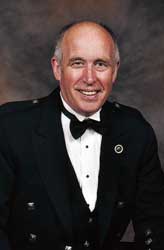Column by Robert Valentine, Senior lecturer of advertising
This is the season of Thanksgiving.
I had intended to visit the library to do a great deal of research so that we could all appreciate this holiday, but I ran out of time. You know how it is.
In any event, I am confident that my memory, bolstered by nearly two generations of seasonal sitcoms, Google searches and the occasional Hallmark Channel special, will be sufficient for this salute to this most pleasant and badly-needed holiday.
I call Thanksgiving “pleasant,” because, to me, hardly anything could be more pleasant than to spend a day in the presence of family and friends, surrounded by the smells of good food cooking.
You can relax and chat, even if you are busy dressing and stuffing a turkey, fixing your signature sweet potato casserole or peeling onions by the dozens.
Good friends and good conversation can make up for the lack of charm in the work of our hands.
Besides, we probably don’t have to go to work or attend classes.
How bad can that be?
THE HISTORY
We celebrate this day because several American presidents have declared the need to set aside a day for Thanksgiving.
If memory serves, Washington, Lincoln, Roosevelt and Harrison Ford all named a national day of Thanksgiving.
Roosevelt’s choice was written into law by the Congress, which was desperate for a break in the furious workload after being in session for five consecutive days without a golf tournament or investigative visit to Hawaii. The date was set as Nov. 24, 25, 26 or 27, depending on the NCAA football schedule or the need for a “Thanksgiving Special” to take the place of whatever TV show was failing in the ratings at the time.
The first Thanksgiving was declared by the Pilgrims.
The Pilgrims were a group of religious dissidents who fled persecution in Europe rather than succumb to pressure from the Catholic Church to refrain from bringing hash brown casseroles and chocolate pies to their religious services. They also wore funny hats.
The plucky Pilgrims brought their hats and their practices to the New World, as it was known in those days, at a town named Plymouth Rock. (You may remember that the New World was bought out by the United States in a corporate takeover engineered by James Madison, at which time the name of Plymouth Rock was changed to “Logan Airport Marriott.”)
After their first year, they gave thanks for a bountiful harvest, a playoff berth for the New England Patriots and the fact that nearly half of them were still alive.
We may wonder why they were feeling so thankful.
In fact, they hardly had anything to eat and their houses had no cable television at all. As luck would have it, they were helped by a friendly Native American whose name was something like “Tonto” or, perhaps “Johnny Depp.” The exact spelling was lost to us during the great flood of 1932.
Tonto showed them how to plant corn by using fish instead of seeds. While the corn grew fast, you had it eat on the first day, or bury it in the back yard. Tonto also helped them hunt for the elusive Native American bird, the turkey. Eventually, after days of searching, they found two turkeys at Kroger.
So, after days of preparation, the Pilgrims finally sat down to the first Thanksgiving dinner.
After a long prayer, during which the mashed potatoes got cold, they settled into the traditional bout of overeating that we recreate each November in commemoration of their sacrifice, their good luck, their pluckiness and their devotion to having large religious gatherings using covered dishes to excess.
And then there’s binge football and manic shopping.
How American!
Enjoy! By the time you get back to campus, it will all be over.




























































































